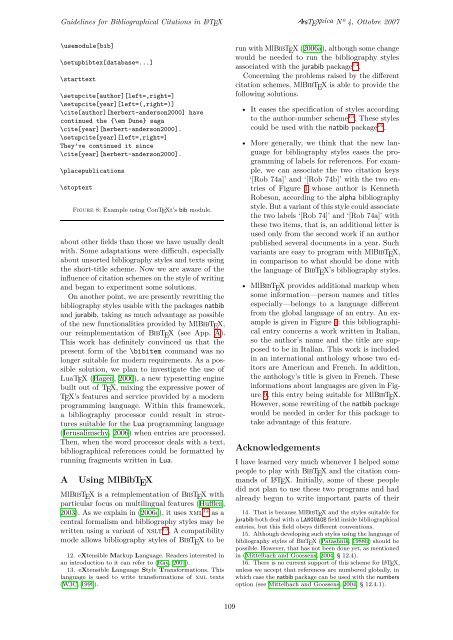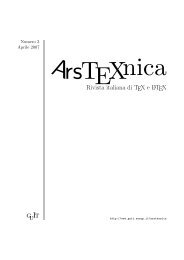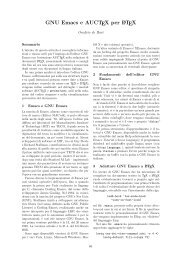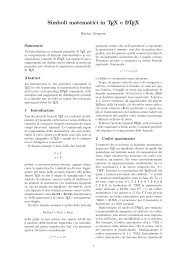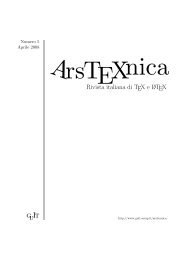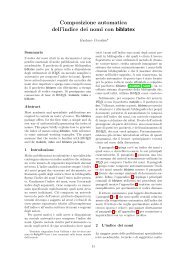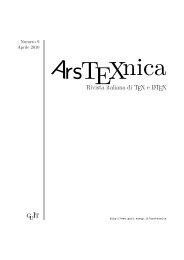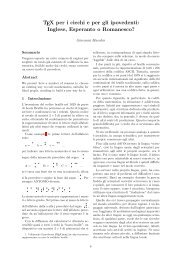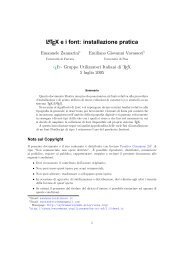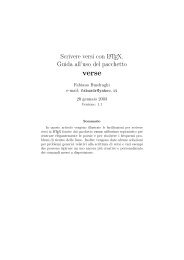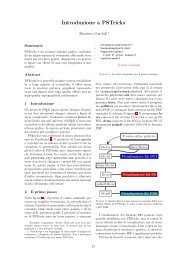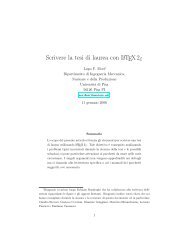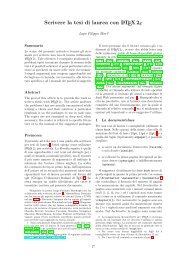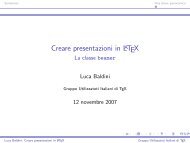ArsTeXnica, Numero 4, Ottobre 2007 - GuIT - Scuola Superiore Sant ...
ArsTeXnica, Numero 4, Ottobre 2007 - GuIT - Scuola Superiore Sant ...
ArsTeXnica, Numero 4, Ottobre 2007 - GuIT - Scuola Superiore Sant ...
Create successful ePaper yourself
Turn your PDF publications into a flip-book with our unique Google optimized e-Paper software.
Guidelines for Bibliographical Citations in L ATEX ArsTEXnica Nº 4, <strong>Ottobre</strong> <strong>2007</strong><br />
\usemodule[bib]<br />
\setupbibtex[database=...]<br />
\starttext<br />
\setupcite[author][left=,right=]<br />
\setupcite[year][left=(,right=)]<br />
\cite[author][herbert-anderson2000] have<br />
continued the {\em Dune} saga<br />
\cite[year][herbert-anderson2000].<br />
\setupcite[year][left=,right=]<br />
They’ve continued it since<br />
\cite[year][herbert-anderson2000].<br />
\placepublications<br />
\stoptext<br />
Figure 8: Example using ConTEXt’s bib module.<br />
about other fields than those we have usually dealt<br />
with. Some adaptations were difficult, especially<br />
about unsorted bibliography styles and texts using<br />
the short-title scheme. Now we are aware of the<br />
influence of citation schemes on the style of writing<br />
and began to experiment some solutions.<br />
On another point, we are presently rewriting the<br />
bibliography styles usable with the packages natbib<br />
and jurabib, taking as much advantage as possible<br />
of the new functionalities provided by MlBibT E X,<br />
our reimplementation of BibT E X (see App. A).<br />
This work has definitely convinced us that the<br />
present form of the \bibitem command was no<br />
longer suitable for modern requirements. As a possible<br />
solution, we plan to investigate the use of<br />
LuaTEX (Hagen, 2006), a new typesetting engine<br />
built out of TEX, mixing the expressive power of<br />
TEX’s features and service provided by a modern<br />
programming language. Within this framework,<br />
a bibliography processor could result in structures<br />
suitable for the Lua programming language<br />
(Ierusalimschy, 2006) when entries are processed.<br />
Then, when the word processor deals with a text,<br />
bibliographical references could be formatted by<br />
running fragments written in Lua.<br />
A Using MlBibT E X<br />
MlBibT E X is a reimplementation of BibT E X with<br />
particular focus on multilingual features (Hufflen,<br />
2003). As we explain in (2006c), it uses xml 12 as a<br />
central formalism and bibliography styles may be<br />
written using a variant of xslt 13 . A compatibility<br />
mode allows bibliography styles of BibT E X to be<br />
12. eXtensible Markup Language. Readers interested in<br />
an introduction to it can refer to (Ray, 2001).<br />
13. eXtensible Language Style Transformations. This<br />
language is used to write transformations of xml texts<br />
(W3C, 1999).<br />
109<br />
run with MlBibT E X (2006a), although some change<br />
would be needed to run the bibliography styles<br />
associated with the jurabib package 14 .<br />
Concerning the problems raised by the different<br />
citation schemes, MlBibT E X is able to provide the<br />
following solutions.<br />
• It eases the specification of styles according<br />
to the author-number scheme 15 . These styles<br />
could be used with the natbib package 16 .<br />
• More generally, we think that the new language<br />
for bibliography styles eases the programming<br />
of labels for references. For example,<br />
we can associate the two citation keys<br />
‘[Rob 74a]’ and ‘[Rob 74b]’ with the two entries<br />
of Figure 1 whose author is Kenneth<br />
Robeson, according to the alpha bibliography<br />
style. But a variant of this style could associate<br />
the two labels ‘[Rob 74]’ and ‘[Rob 74a]’ with<br />
these two items, that is, an additional letter is<br />
used only from the second work if an author<br />
published several documents in a year. Such<br />
variants are easy to program with MlBibT E X,<br />
in comparison to what should be done with<br />
the language of BibT E X’s bibliography styles.<br />
• MlBibT E X provides additional markup when<br />
some information—person names and titles<br />
especially—belongs to a language different<br />
from the global language of an entry. An example<br />
is given in Figure 9: this bibliographical<br />
entry concerns a work written in Italian,<br />
so the author’s name and the title are supposed<br />
to be in Italian. This work is included<br />
in an international anthology whose two editors<br />
are American and French. In addition,<br />
the anthology’s title is given in French. These<br />
informations about languages are given in Figure<br />
9, this entry being suitable for MlBibT E X.<br />
However, some rewriting of the natbib package<br />
would be needed in order for this package to<br />
take advantage of this feature.<br />
Acknowledgements<br />
I have learned very much whenever I helped some<br />
people to play with BibT E X and the citation commands<br />
of L ATEX. Initially, some of these people<br />
did not plan to use these two programs and had<br />
already begun to write important parts of their<br />
14. That is because MlBibT E X and the styles suitable for<br />
jurabib both deal with a LANGUAGE field inside bibliographical<br />
entries, but this field obeys different conventions.<br />
15. Although developing such styles using the language of<br />
bibliography styles of BibT E X (Patashnik, 1988b) should be<br />
possible. However, that has not been done yet, as mentioned<br />
in (Mittelbach and Goossens, 2004, § 12.4).<br />
16. There is no current support of this scheme for LATEX,<br />
unless we accept that references are numbered globally, in<br />
which case the natbib package can be used with the numbers<br />
option (see Mittelbach and Goossens, 2004, § 12.4.1).


